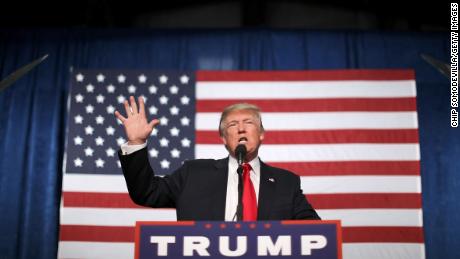Story highlights
- Frida Ghitis: Donald Trump Jr.'s decision to take a meeting with a Russian lawyer who had alleged ties to the Kremlin is the most baffling political move yet
- We should primarily be concerned with whether this could lead investigators to evidence of collusion between the Trump campaign and Russia
Frida Ghitis is a world affairs columnist for The Miami Herald and World Politics Review, and a former CNN producer and correspondent. The views expressed in this commentary are her own.
(CNN)Donald Trump Jr.'s decision to take a meeting with a Russian lawyer who had alleged ties to the Kremlin may be the most baffling move by a high-level political operative in recent memory. Second only to his apparent thinking that such a meeting would be a good decision.
The emails show -- and, by releasing them, Trump Jr. acknowledges -- that he agreed to meet someone he was told was a "Russia government attorney," and someone who was alleged to have "very high level and sensitive information" to incriminate Hillary Clinton.
In short, the emails suggest he was prepared to meet with a potential agent of a hostile foreign government. And because he was joined by key campaign players Jared Kushner and then-campaign manager Paul Manafort, we know this was no casual meeting.
Why would Trump Jr. make these communications public? It seems that he was trying to beat the New York Times to the punch line, releasing the emails in the name of transparency -- a decision his father later praised.
Regardless, the President's son has shown astonishingly poor judgment. The email chain only makes this whole incident look more troubling. Earlier, Trump Jr. explained that he had met with the Russian lawyer Natalya Veselnitskaya to discuss adoptions. Then he claimed he didn't know who he was meeting, adding that the she didn't offer dirt on Clinton -- as if that somehow made the meeting acceptable.
Whether or not this might amount to treason, as Sen. Tim Kaine, D-Virginia, suggested, or whether it represents collusion, coordination, obstruction or any violation of the law are not the main issues. Instead, what should trouble the American people most is whether this incident will lead investigators to evidence that Trump acquiesced to and accepted help from Russia, based on the Kremlin's interference in the heart of America's democracy, its presidential elections. And if there is something beyond that.
One of the most curious aspects of Trump's political campaign and his presidency has been his interest in reversing policy on Russia.
That became strikingly evident just one month after the meeting with Veselnitskaya, when Republican delegates met to draft the platform for the party's convention.
Republicans had, until then, held strong positions regarding Russia's intervention in Ukraine and its illegal annexation of Crimea. It was Russia's 2014 invasion and seizure of the Crimean Peninsula, and Moscow's subsequent support for Ukrainian separatists fighting against the Ukrainian government, that prompted the United States to impose sanctions.
The Republican platform committee proposed language on the subject that would have been uncontroversial before Trump's success. But then, the Washington Post reports, Manafort and Trump's delegates pushed back, orchestrating changes that deleted a call to provide arms to Ukraine to help it defend itself from Russian forces fighting on its territory. Other language, including increasing sanctions against Russia and noting that "the post-Cold War ideal of a 'Europe whole and free' is being severely tested by Russia's military aggression," disappeared, even though they represented the view of the Republican foreign policy establishment.
That was one year ago. Now Trump is President and, according to senior officials in the White House, he's looking for ways to ease sanctions.
So is this definitive proof that Trump is paying Vladimir Putin back for what US intelligence officials say was a concerted effort by the Kremlin to help Trump win the election? No, it isn't. But it is one more piece of the puzzle in the curious relationship between the two world leaders.
Relations with Russia are one area where Trump is pushing hard against both Republicans and Democrats. Just consider the bill tightening sanctions approved last month by a nearly unanimous Senate vote -- 98 to 2. The White House is now pressuring the House to water it down significantly before it becomes law.
Trump's dealings with Russia are a never-ending stream of controversy. He met in the Oval Office with the Russian foreign minister and the ambassador to the United States, giving them highly classified information. As President, Trump has the authority to declassify any material he wishes to, but the move -- revealing information provided by an ally without the ally's permission -- was shocking. Critics called it "reckless" and "dangerous."
Trump has gone out on a thin limb, risking charges of obstruction of justice to protect Mike Flynn, who lost his White House job after lying about contacts with Russians. Half a dozen campaign aides failed to disclose contacts with Russia. And Attorney General Jeff Sessions initially denied, under oath, meeting with the Russians. He reversed course when journalists uncovered evidence of his meeting with the Russian ambassador and then claimed the two had not discussed the campaign.
Trump is eager to move forward on cooperation with Russia, as we saw after his meeting with Putin in Hamburg, but the cloud hanging over his administration has so far prevented policy reversals. The fallout right now would be too great.
But if the investigations come to a close, Trump is likely to change policy.
We now know that Russia did work to help Trump get elected. US intelligence agencies have "high confidence" in that, and the emails suggest it. We can also see that Trump is, in fact, trying to recast US policy in some areas beneficial to Putin. It happened during the Republican platform drafting, and it has continued during his presidency.
What we don't know, and the key to how this will unfold, is whether the latter is a consequence of the former. But if Trump Jr. continues trying to defend himself so ineptly, we may soon get the answers from him.























